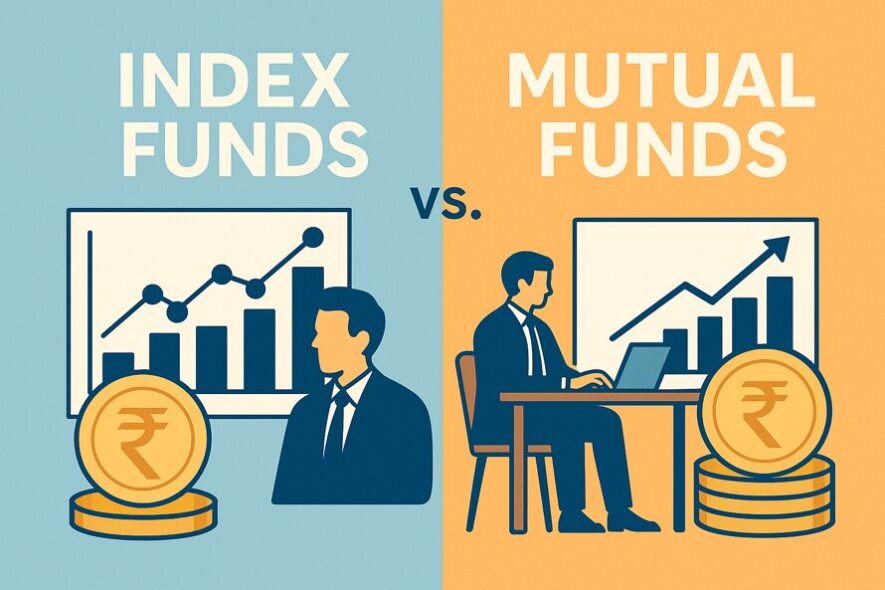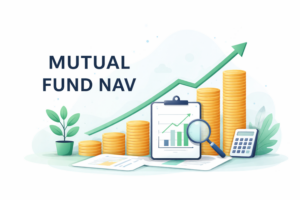Index Funds vs. Mutual Funds: Understanding the Key Differences

Introduction to Index and Mutual Funds
Investing has a way of overwhelming new investors. Given the numerous investment choices available, investors often find themselves confused. That’s where pooled investment products step in. Instead of picking single stocks, you join thousands of others, pool your money, and let a fund do the heavy lifting.
Two names dominate this space: mutual funds and index funds. They are similar in many ways. Both collect money from investors. Both spread it across different assets. Both give you access to markets without needing to trade every day. But here’s the twist: the way they operate is different. Understanding these differences isn’t just theory; it shapes how much you’ll pay, how much risk you’ll carry, and what kind of returns you might actually see.
What is a Mutual Fund?
Think of a mutual fund as a professional cricket team. You, along with millions of investors, chip in money. A manager, the captain, calls the shots. They decide who gets to play, how the team lines up, and when to switch strategies. If the manager reads the pitch well, your team wins. If they misjudge, you pay the price.
Actively Managed Strategy
Most mutual funds are built on active management. This means the manager and their team don’t just sit back and mimic the market. They constantly analyze, buy, sell, and reshuffle the portfolio to beat a benchmark like the Nifty 50 or Sensex. For instance, an equity fund may tilt more toward banking stocks if the manager feels the sector is heating up.
Fund Manager’s Role
In mutual funds, the fund manager isn’t in the background; they’re front and center. Their decisions on which stock to add, which bond to hold, and when to exit shape your returns. For investors, it’s a matter of trust. You’re essentially betting on their skill, judgment, and ability to read the market.
Types: Equity, Debt, Hybrid, etc.
Mutual funds come in different flavors to suit different investor types:
- Equity funds: Heavy on stocks, higher risk, but potential for strong growth.
- Debt funds: Focused on bonds, they offer stability and regular income.
- Hybrid funds: A blend of stocks and bonds for balanced exposure.
- Sectoral/thematic funds: Target niches like pharma, IT, or energy. High-risk, high-reward plays.
This flexibility is why mutual funds are often the go-to choice for Indian households starting their investment journeys.
What is an Index Fund?
Now, picture a different approach. Instead of trying to pick the winning team, you decide: “I’ll just mirror the scoreboard.” That’s what an index fund does. It doesn’t try to outsmart the market; it simply mimics it.
Passively Managed Strategy
Index funds are the ultimate passive players. If the chosen index has Infosys at 5% weight, the fund does the same. If Reliance gets bumped up in the index, the fund adjusts accordingly. No research hunches, no last-minute calls, just a mechanical mirroring of the market.
Tracking Market Indices (e.g., Nifty 50, Sensex)
Take the Nifty 50. If you buy a Nifty index fund, you own a slice of all 50 companies in the exact same proportion as the index. When the index rises, your fund rises. When it dips, you go down with it. Think of it as shadowing the topper in class; you may not become smarter than them, but you’ll never fall behind either.
Lower Expense Ratio and Turnover
Here’s the kicker: because there’s no brainpower needed for picking or timing, index funds are cheaper. Expense ratios are far lower, sometimes less than 0.2%. And since turnover is minimal, you avoid excessive trading costs. Over the decades, these small savings can make a big difference to your portfolio.
Key Differences Between Index Funds and Mutual Funds
Let’s stack them side by side. The contrast becomes clear once you understand how each operates.
Management Style (Active vs. Passive)
Mutual funds are active. Fund managers make constant decisions to try and beat the benchmark. Index funds are passive. They mimic the index tightly and accept market returns.
Cost and Expense Ratio
Active management comes at a price. Expense ratios in mutual funds often hover around 0.5–1%, covering manager salaries, research, and trading expenses. Index funds? They run lean, with costs often below 0.5%. That difference might sound small, but stretched over 15–20 years, it can eat or add lakhs to your portfolio.
Performance vs. Benchmark
Mutual funds aim to outperform their benchmarks. Sometimes they do, especially in bull markets or when managers spot undervalued gems. But not all managers succeed. Index funds aim only to match the relevant index.
Risk and Volatility
Mutual funds carry market risk plus manager risk. A poor call by the manager can mean lagging the benchmark. Index funds carry only market risk. If the market falls, you fall with it, but there’s no extra drag from misjudged stock picks.
Suitability for Different Investor Types
If you like the idea of market-beating potential and don’t mind slightly higher costs, mutual funds work. If you prefer predictability, low cost, and a hands-off approach, index funds are your friend.
Pros and Cons of Index Funds
Simplicity and Cost Efficiency
The biggest advantage of index funds is their no-drama simplicity. They don’t rely on superstar managers or fancy strategies. You know exactly what you’re buying: exposure to the market index, at a rock-bottom cost.
Limited Downside Protection
However, here’s the flip side: if the index tanks, your fund will also tank. There’s no one steering the ship defensively. In a prolonged bear market, that can feel painful.
Pros and Cons of Actively Managed Mutual Funds
Potential to Outperform the Market
The lure of mutual funds lies in their ability to create alpha, returns above the index. Skilled managers, using research and timing, can deliver outsized gains. For instance, during certain bull runs, Indian equity funds have beaten the Nifty by wide margins.
Higher Costs and Manager Dependency
But active management isn’t free. Higher expense ratios and frequent trades cut into net returns. Plus, your fortunes are tied to the manager’s skill. If they get it wrong, you lose.
Tax Efficiency Comparison
Turnover Impact on Taxation
Mutual funds churn portfolios more, which can create taxable events. Short-term gains get taxed higher rate. Index funds, with their buy-and-hold structure, usually rack up fewer taxes in the short run.
Long-Term Capital Gains Considerations
Index funds are treated as equity funds for tax purposes. But index funds often come out slightly ahead, thanks to their lower turnover and expense ratios.
Which One Should You Choose?
This isn’t about which is “better.” It’s about what’s better for you.
Based on Investment Goals and Risk Appetite
If you want simple, low-cost exposure and are happy earning whatever the market delivers, index funds are perfect. If you want a shot at higher-than-market returns and are okay with higher costs, mutual funds can be rewarding.
Based on Market Knowledge and Involvement
If you don’t want to track markets closely, index funds let you stay invested without worry. If you’re comfortable reviewing fund performance and trusting manager’s skill, mutual funds are worth it.
Conclusion
At the heart of Index Funds vs. Mutual Funds, it’s a battle between active versus passive. Mutual funds lean on manager expertise, charging more but with the promise of better-than-market returns. Index funds stick to the basics, delivering steady, market-matching returns at low cost.
For most investors, the best answer lies in mixing both. Use index funds for core exposure, cheap, stable, long-term. Add mutual funds for targeted bets or when you want a manager’s skill to capture more growth.
Investing isn’t about choosing the “perfect” product. It’s about building a portfolio that fits your life, your goals, and your tolerance for risk.
FAQs:
Q. Are index funds safer than mutual funds?
Not really. Both face market risk—when the market dips, both go down. The difference is that index funds don’t carry manager risk since they just mirror the index. Mutual funds, on the other hand, can underperform if the manager makes bad calls. So index funds feel more predictable, but not “safer” in the sense of avoiding market swings.
Q. Can index funds give better returns than active mutual funds?
Yes, and it happens more often than you’d think. Over long stretches, many active funds struggle to consistently beat their benchmarks after accounting for costs. Since index funds charge significantly lower fees, they often deliver higher net returns—even if they simply track the market.
Q. Do index funds have fund managers?
Technically, yes. Every fund needs a manager to ensure it tracks the index properly. But unlike active mutual funds, these managers don’t make judgment calls or stock-picking decisions. Their job is operational—keeping the fund aligned with the index, adjusting weights when the index changes.
Q. Are index funds good for long-term investing?
Absolutely. Index funds thrive on time and compounding. Their low costs and market-mirroring nature make them great for long-term wealth building. If your horizon is 10–20 years, they’re a simple way to ride the growth of the economy without worrying about constant fund manager performance.
Q. How do I know if a mutual fund is active or passive?
It’s usually in the name or description. If the fund says “index fund” or “ETF,” it’s passive. If it just says “equity fund,” “bluechip fund,” or “flexicap fund,” it’s active. Another quick check? Look at the expense ratio. Active funds charge higher fees (often 1–2%), while passive funds charge much lower fees (under 0.5%).
Disclaimer
The stocks mentioned in this article are not recommendations. Please conduct your own research and due diligence before investing. Investment in securities market are subject to market risks, read all the related documents carefully before investing. Please read the Risk Disclosure documents carefully before investing in Equity Shares, Derivatives, Mutual fund, and/or other instruments traded on the Stock Exchanges. As investments are subject to market risks and price fluctuation risk, there is no assurance or guarantee that the investment objectives shall be achieved. Lemonn (Formerly known as NU Investors Technologies Pvt. Ltd) do not guarantee any assured returns on any investments. Past performance of securities/instruments is not indicative of their future performance.







